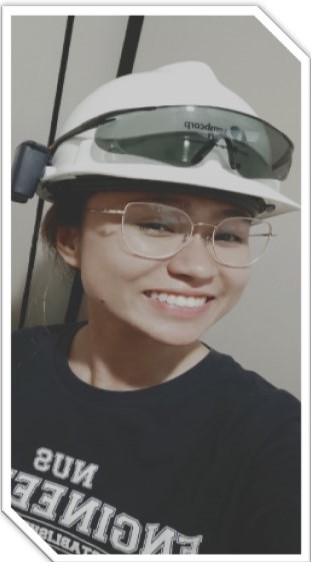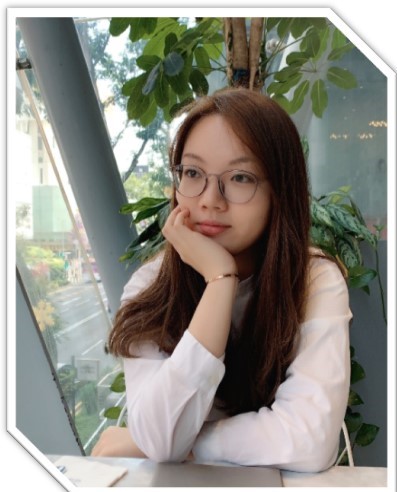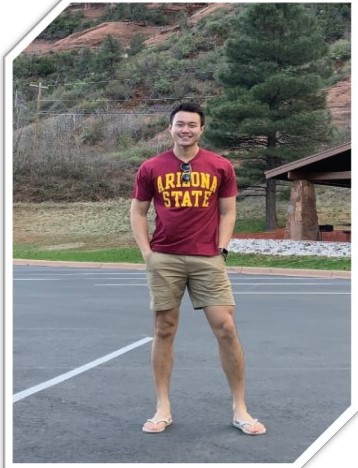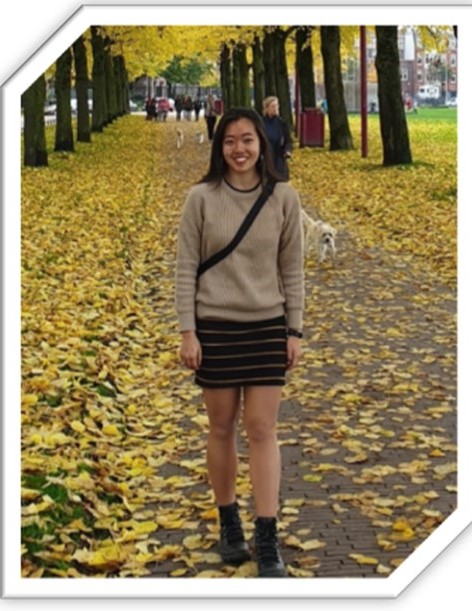I am NUS CEE Student
Brian See Wei Ren, Gerrah Lei Montano Pamplona, Cho Qi An Celine and Ding Ning Ke, Sophia are our current undergraduate students. Brian and Gerrah are from Civil engineering programme. Brian is currently in year 3 and Gerrah is from the graduating class of 2020. Celine and Sophia are from Environmental Engineering. They are currently in year 3 and year 2 respectively.
Through this “I am NUS CEE Student” series, they will be sharing their memories as a freshman and also sharing some tips on how to prepare for the upcoming semester.
Gerrah Lei Montano Pamplona - Final Year B.Eng(Civil) Student

Gerrah Pamplona graduated from our Civil Engineering programme in 2020. She now works in the civil engineering industry. She is an alumnus of Singapore Polytechnic.
An engineer by day and an entertainer by night. She has strong passion for live band singing and has been shining on stage as a vocalist for several years now. Her CCA, NUS Amplified nurtured her love for performing.
How did you prepare yourself for the new semester in NUS, as a freshie?
To prepare myself mentally:
I was fortunate to have gone for orientation camps. If you’re an introvert like myself it will feel like digging your own grave as you sign up and walk into the hall full of strangers while hugging your sleeping bag. But I promise this is the best way to minimize the social-interaction nerves that first-days usually bring.
With the current hurdle of the world, YouTube may be the next best thing! I did a massive YouTube marathon! – Watching all the videos about NUS gave me a glimpse of that it would be like to be in NUS. There are some student-made contents on YouTube that were helpful because they showed NUS from a student’s perspective. I also visited the campus for fun prior to the semester. Just being there and knowing what to expect really helped prepare myself mentally.
To prepare myself logistically:
I am sure I am not the only one who gets excited shopping for new stationery. What Toys R Us meant to kids was what Popular meant to me! I even got myself a new measuring tape because I thought it was a cute token to remind myself that I am now working towards getting that Civil Engineering degree. Just remember, not be carried away with stationery shopping.
What are the things you wish you knew back then to be better prepared?
Get ready to meet very passionate professors who can dive deep into derivations and explanations. Although it provides you detailed and deep understanding on the concept, not everything that is presented to us during lectures will be examined. I wished someone shared that with me
Stepping into such a lecture, just as you are adjusting back into the academic rigor, can lead you feeling overwhelmed.
Remember to at least browse through past year papers to help you test your understanding of the module objectives. This is also my study tip!
What are some tips on studies, choosing modules, UROP, SEP etc?
All students are given the opportunity to take modules outside of their courses (called unrestricted elective modules,UEM). Coming from an engineering major, I knew I needed my “art fix” hence I signed up for: “The Science of Art and the Art of Science”. I had such a blast in this module. I remember the 2 main projects I submitted: Firstly, I analyzed a fun infographic of a burger. Secondly, I built a model to explain the design errors of the infamous Nicoll Highway collapse. Casting palm-sized diaphragm walls made of concrete in my dorm room was one of the highlights of my university life.
Remember to grab that chance to learn other things that interest you.
Be mindful when choosing your design project and electives. Start with the end in mind, so choose modules that allow you to play with your strengths and modules you would like to possibly work on when you enter the workforce.
Any favourite modules in year 1 and why was it your favourite?
I skipped right into Year 2 because I was from Singapore Polytechnic. In the first semester, I enjoyed CE2183 – Construction Project Management where I learnt about real-world problems through Prof David’s anecdotes. It is a joy to be taught by professors who have been there and done that.
I wish you all the best!
Ding Ning Ke, Sophia - Year 2 B.Eng(Environmental) Student

Ding Ning Ke, Sophia is currently in year 2 Environmental Engineering Programme. She is an active member of Environmental Science and Engineering Student Club (ESESC). Sophia is the Project director and has been planning for CESE Camp,2020 meant for freshman. During her free time, she plays the piano and cello. She is an alumnus from Raffles Institution.
How did you prepare yourself for the new semester in NUS, as a freshie?
I took the effort to find out more about the course and related module materials from seniors. This really helped me to prepare myself as a freshie to understand the structure and flow of the modules. I also kept an open mind when coming across new information, which was especially useful while adjusting to the new environment.
What are the things you wish you knew back then to be better prepared?
I wish I knew my way around the engineering faculty better before school started so I would not get lost when trying to find my tutorial classrooms.
I eventually learned my way around the school by paying closer attention to the directional signboards
What are some tips on studies, choosing modules, UROP, SEP etc?
It is always good to keep up with the lesson flow so that you would not have to last minute mug for exams. Sometimes, it is also especially useful to reach out to your professors or tutors if you need academic assistance. There are a variety of modules offered here in NUS and you can almost choose any module so long as you meet the prerequisite of that module.
Any favourite modules in year 1 and why was it your favourite?
My favourite module is ESE2102, Principles & Practice in Infrastructure and Environment. This module consists of many field trips and focused on enhancing the hands-on experience for students therefore, I enjoyed this module the most.
Did you take minor/majors or specialisation?
My current major is Innovation & Design Programme (IDP). I choose this major because I wanted to be exposed to methods of bringing engineering process to the business market. Very often, as an engineer, our role is to solve a given a problem and IDP teaches us exactly that on top of bringing the solution to life!
Brian See Wei Ren - Year 3 B.Eng(Civil) Student

Brian See Wei Ren is currently in the Year 3 Civil Engineering Programme. He is also a national discus thrower and has recently represented Singapore in the 2019 SEA Games. He is an alumnus from Raffles Institution.
How did you prepare yourself for the new semester in NUS, as a freshie?
I prepared myself mentally by reading through online forums and articles related to Civil Engineering. I also got the chance to speak to my seniors about the course, which enabled me to gain a deeper insight into the course and the student life that I will be experiencing in NUS.
Additionally, I got the chance to attend orientation camps prior to the new semester as a freshman. I not only enjoyed myself thoroughly, but I also got the chance to interact with fellow schoolmates from different faculties. From playing games during the camps to bonding sessions outside of school, these orientation camps are among the highlights of my NUS journey thus far
What are the things you wish you knew back then to be better prepared?
I wished that I had revisited my ‘A’ levels’ syllabus (Mathematics and Physics) prior to the start of the course. These are the fundamentals of the course and it would have greatly helped in understanding some of the Civil Engineering concepts. My tip is to revisit your Mathematics and Physics, especially to the NS men.
What are some tips on studies, choosing modules, UROP, SEP etc?
Cramping lectures and tutorials just prior to exams can be very tedious, so always keep up with the lectures and tutorials to the best of your abilities! Having a group of study buddies will also provide a more productive learning environment, and they will be friends to keep for life too! We not only study together, but we also have fun together. We often have meals together while occasionally enjoying recreational activities like watching a movie and playing sports together.
Additionally, Student Exchange Programme (SEP) and Industrial Attachment (IA) are the best learning opportunities/experiences throughout the course. It will be fun and enriching at the same time, so grab these opportunities!
I did my IA at Surbana Jurong’s Coastal Engineering Department. I was able to get hands-on experiences, be directly involved in on-going projects, and meet many wonderful people in this industry. My mentor in Surbana Jurong has boosted my interest in Civil Engineering and provided me with vast opportunities to understand the technical as well as the practical aspect of Coastal Engineering. IA has also deepened my understanding of the importance of Civil Engineering in Singapore and has affirmed my choice in choosing this course.
I did my SEP at Arizona State University (ASU). ASU has been one of the best learning opportunities where I learn to adapt to the US education system, understand the culture, and make friends from all over the world. I even got to travel to different states during my semester there. SEP is one of the highlights of the course and I hope everyone will grab this opportunity when it arises.
One small tip, enjoy the semester breaks to the fullest. Take this opportunity to relax and put a tick on that bucket list of yours!
Any favourite modules in year 1 and why was it your favourite?
CE1101 (Civil Engineering Principles & Practice) is my favourite year 1 module. It is the first time when we get hands-on experience in the course. We get to carry out analysis and eventually build the structure using everyday items like paper and ice cream sticks. You’ll be very surprised at how much weight the structure can carry!
But fret not, this might be my favourite module but you will definitely enjoy all the modules taught in this course.
Cho Qi An Celine - Year 3 B.Eng(Environmental) Student

Cho Qi An Celine is currently in her 3rd Year of B.Eng (Environmental) programme. She was part of the executive committee of Project OceaNUS in 2017/2018 as the co-marketing director and also took part as the Creative Director of Faculty of Engineering Rag main committee in 2017/2018. In her free time, she enjoys contemporary dance and exploring new places in Singapore on foot. She is an alumnus from Hwa Chong Junior College.
How did you prepare yourself for the new semester in NUS, as a freshie?
I started my first semester with an open mind. You don’t have to worry much on preparing for the upcoming semester as most of the year 1 modules incorporate a revisit to the concepts that taught in junior college.
What are the things you wish you knew back then to be better prepared?
I wish I had tips on how to plan my modules better. My advice for the freshman is to speak to your seniors and mentors assigned by the department to get some tips on planning your modules out.
What are some of the programmes you were involved in?
Undergraduate Research Opportunity Programme (UROP)
I took on a UROP project titled “Characterization and occurrence of cyanobacteria in algal blooms” under Professor Karina Gin. One of the research areas that Prof Gin and her team are working on is the study of different types of cyanobacteria bloom species and their off-flavor and toxin producing abilities.
My UROP project to determine the optimal qPCR conditions for the Pseud primer in the dectection of Pseudanabaena sp. Under the mentorship of Dr Te Shu Harn, I learnt to extract DNA from an environmental sample, perform qPCR and gel electrophoresis. As I was also taking ESE3301 (Environmental Microbiological Principles) when doing UROP, I could apply the concepts that I learnt in class which deepened my learning and understanding of the lab work.
Student Exchange Programme (SEP)
In the first semester of my 3rd Year, I went on exchange to University of Oulu in Oulu, Finland. I could map over ESE3401 (Sustainable Urban Water Technologies), ESE3201 (Air Quality Management), ESE4405 (Urban Water Engineering & Management) and ESE4406 (Energy and the Environment). It was a unique experience studying environmental engineering in Finland. The modules that I took covered interesting topics such as nuclear power plants, river restoration, problems faced in water resource management due to climate change and water treatment in a temperate country. It was also interesting to see that the discussion on renewable energy in Finland was far beyond the mere implementation and feasibility stages, but instead, is focused on optimisation of infrastructure to further reduce the reliance on fossil fuels. The modules were more focused on the application of concepts rather than the theoretical understanding. We learned to use software programmes such as ArcGIS, HOMER Pro and CROPWAT 2.0 for environmental simulations and analysis.
As I stayed in the school accommodations, I had many international housemates and had many opportunities for cultural exchange. Living in subarctic Oulu was a unique experience, as I experienced a beautiful autumn with the northern lights and a very snowy winter with 3 hours of daylight! As an environmental engineering student, it was also interesting to observe their use of electric buses, claiming deposits from returning plastic/aluminium bottles/cans at supermarkets and also actively taking part in sorting my waste into 7 different material types during disposal (e.g. biowaste, combustible waste, glass, metal etc).
Apart from my experiences in Oulu, I also had the opportunity to travel around Europe. With good time management and planning, I was able to travel to 13 countries during my exchange.
Industrial Attachment (IA)
I am currently on industrial attachment in the Environment Business Line at AECOM Singapore Pte Ltd. I had the opportunity to be part of the water resources group of the Impact Assessment and Permitting (IAP) team. I’ve been able to contribute to their various projects on Environmental Impact Assessments and Environmental Baseline Studies. During my internship, there were exciting opportunities for field work such as water quality sampling and surveying of hydrological conditions.
What are some tips on studies, choosing modules, UROP, SEP etc?
Tips on Studies:
Consistency is important, especially since even the smallest graded assignments can also count towards the final grade. Keeping up with lectures weekly is a good way to keep oneself in check.
Tips on Choosing Modules:
A tip for planning modules within the semester is to first identify the number of final exams you’ll have to take based on the required core modules, then plan for the remaining non-core modules (e.g. Unrestricted Elective Modules (UEM) & General Education (GE) modules) – which you will have more liberty to choose the module type. For example, for a semester with 4 final exams for 4 core modules, I decided to take a GE module with no finals (100% Continuous Assessment (CA)). This can help reduce the exam stress during preparation for finals.
Tips on choosing a UROP project:
For interested students, you may log in to the “undergraduate enhancement programme system” portal to look for a list of available projects. Alternatively, if you are interested in a specific professor’s area of research, you can approach them to express your interest. Professors are always very keen to share more about their area of research. Do take note that the approval is largely dependent on the professor and project availability.
Tips on Student Exchange Programme (SEP)
My advice is to create a list of goals that you want to achieve from the SEP programme and use it as your criteria when selecting the exchange university.
For me, my priorities were to clear ESE3401 and ESE3201 within the semester. Do take note that not all universities offer both modules in the same semester. I also wanted to travel around Europe. Therefore, I decided that University of Oulu, Finland was the best choice for me. I would also highly recommend to talk with seniors about their exchange experience at your university of interest.
To be able to have a rich and fruitful experience on SEP, my advice is to step out of your comfort zone in order to try new things and meet new people. I even got to solo-travel – which was something I never thought I had the courage to try. Apart from the new friendships forged and new experiences, SEP was also a journey of personal growth and has allowed me to become a more confident person. For those interested in travelling, time management and good planning is key for planning trips as you may need to skirt around the exam dates and submissions.
Any favourite modules in year 1 and why was it your favourite?
My favourite module in year 1 was ESE2102 (Principles & Practice in Infrastructure and Environment). There was a lot of hands-on learning in the laboratory and got to conduct sampling as well! Overall, it was a great exposure to environmental monitoring and the module was very similar to actual environmental consultancy work!

